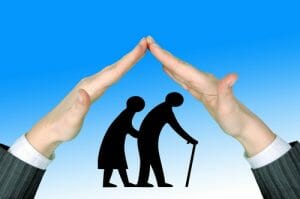Have you ever thought about who’s going to take care of you in “old age”? Things like financial management, technology challenges, daily living issues like shopping and doctor visits, and end-of-life decisions. Whether you have kids or not, it’s important to start thinking about it right now.
 After watching how both my folks and my husband’s folks were helped by their kids in making some big decisions about their living situations, and subsequent help in getting moved to their respective retirement communities, it started occurring to me that they had advantages I don’t have — built in personal-care assistants. I don’t regret one moment not having children because my life has been wonderful the way it is, though I have begun to see I need to approach my senior years a bit differently.
After watching how both my folks and my husband’s folks were helped by their kids in making some big decisions about their living situations, and subsequent help in getting moved to their respective retirement communities, it started occurring to me that they had advantages I don’t have — built in personal-care assistants. I don’t regret one moment not having children because my life has been wonderful the way it is, though I have begun to see I need to approach my senior years a bit differently.
Becoming a senior (my definition of senior is different than AARP’s or Social Security’s ideas) is much more than having adequate funds for retirement, though that is vitally important. As important as financial stability is, having your health is at least as important.
You have heard that a “hundred” times, and probably rolled your eyes at the concept too because it’s become almost a trite phrase. Even if you think it’s trite or an empty “lecture”, chances are you aren’t looking at the picture of health with a large enough focus, or from a good vantage point.
A quote I recently heard reflects my beliefs nicely. “If you have your heath, you have a thousand wishes. If you don’t have your health, you have just one wish.”
Here’s my perspective on what health means and why it’s important to me for reaching senior status. Health, in my usage here, is multi-dimensional and it starts with your brain. Your brain is where you make the good decisions that impact all areas of your life like your gut and physical health, strength and endurance, and your attitude. Your brain ultimately determines your level of wellness.
A disciplined brain is a healthy brain because it helps support sound decision making, combats negative thoughts that drain your happiness, and distort your thinking. Distorted thoughts drive illness and aging. What’s good for your brain is good for your heart and body. When you have a better brain you have a better life.
There are myriad factors that impact your aging, and you have control over most of them. When you avoid inhaling organic solvents, too much alcohol, hitting your head, dehydration, foods with a high glycemic index and low fiber, too much caffeine, and inactivity, you increase your likelihood of having a healthy brain. This approach also improves your chances of reaching a vibrant “old age”.
Watching the seniors in my life — family, friends, and EMT patients — I see that those who choose to take care of themselves fully make better decisions. Their younger “family” members may assist them, but without the brain function to make sound decisions, even the “family” guidance may not be enough to keep the senior on a safe path.
I only have me to rely on. Even if the younger family members in my life step up to be my personal-care assistants, I still want to be capable enough to make my own way and not burden them. You also only have you, and for the same reasons.
While I’ve long been focused on having better health and high energy and joy, I see the value of being even better. A disciplined mind is something I tend to struggle with. My lack of discipline means I sometimes let negative thoughts rule my “now”. That turns into me cheating on my decision to avoid certain foods, especially when I’m feeling stressed, and making excuses for not moving or exercising enough.
I have an idea for my life insurance: my “Better Aging” plan:
✓ pay attention to the emotions that come up in my life and deal with them rather than let them sway by discipline into eating foods I’ve deemed unhealthy for a vital senior life
✓ live a balanced life, living equally from what I call the Four Buckets (Health, Wealth, Work, and Play)
✓ keep my weight within my ideal weight range
✓ hydrate with at least 3 liters of water daily
✓ sleep 7-8 hours each night
✓ eat whole, organic foods that support a healthy brain and body
✓ avoid brain-damaging foods like sugar and highly processed foods
✓ move daily with cardiovascular exercise, walking, and stretching
✓ meditate one to two times daily
✓ keep an attitude of gratitude and positivity
✓ express appreciation to the people in my life daily.
This plan will pave the way for me to reach my age goal with a vital brain and body so I can live an energized, productive, and joyous life.
What’s your life insurance plan?
